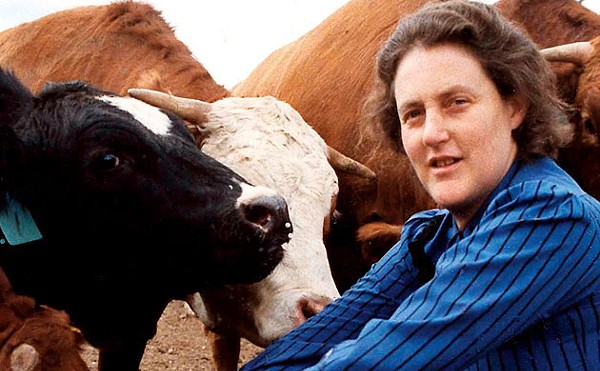The first of these I want to add has been someone I’ve been interested in for a few years, ever since I saw a documentary about her on a C4 documentary (The Woman Who Thinks Like a Cow). I was happy therefore to find her mentioned in nearly every one of my textbooks when I was studying for my psychotherapy degree. Not only is she a woman with incredible achievement and insight, she also has a fascinating story, so much so that an abridged version hardly does her justice so please, please find out more about her if you don’t know her already. Hopefully you have heard the name, but if not I give you...
Dr Temple Grandin (Born 1947 )
You may have heard of Temple Grandin because of her work in innovation, especially in the farming and meat industry in America; or you may have heard of her because she is probably one of the most famous people living with autism in the world at this moment. I say living with rather than autism sufferer, as Temple has always promoted her autism as a unique characteristic rather than a handicap, and is an advocate for autism activism. She has done a lot to explain autism and how the autistic person thinks. In my favourite quote from her she says “What would happen if the autism gene was eliminated from the gene pool? You would have a bunch of people standing around in a cave, chatting and socializing and not getting anything done.”
Temple was born in 1947 in Boston. She didn’t speak until she was three and the doctors wrongly diagnosed her with brain damage. Just as women’s rights were poor in the 1950s, so were those of people with learning difficulties. The doctors advised her parents to put her in an institution. But Temple’s devoted mother was having none of it, and instead did everything she could to help Temple catch up. When her autism was diagnosed, little was known of the condition, and 'emotionally cold mothers' were usually blamed. Temple's mother knew she had been loving and supportive of her daughter so to hear blame from the doctors was devastating.
Although socially she found school, college and even university difficult, she developed ways of overcoming her anxieties. She is quite famous for her invention of the ‘squeeze box’ a device she made to calm herself down, which mimics a hug without human touch, something that many autistic children find uncomfortable. She was inspired to create it after seeing how a similar device calmed down cows on her aunt’s ranch when they were being inoculated. It was here that she also discovered her infinity with cattle, and her long, extraordinary career in livestock management and invention was sparked.
She went on to study livestock management. She was horrified at the way cows on ranches and feedlots were treated. Her empathy for animals motivated her to want to create a more humane system of care and slaughter. Because of her autism, she was able to visualize the process not only in far more detail than anyone else had, she was able to see it from the cattle’s perspective and understand why certain things went wrong in the process. The men she encountered in the industry mocked her observations, but Temple rose above it. Even when they vandalized her car, tried purposely to force her out of the field of study, and mocked her openly – based as much on her sex as her autism as farming was considered ‘a man’s job’, Temple pressed on.
After completing an MA and PhD in animal science, Temple went on to invent many new systems of cattle management and slaughter, wrote countless articles on the subject and lectures on animal welfare to this day. It is estimated that today over half the animals slaughtered in the US are done so through systems Temple designed. It may seem a ironic that someone who loves and cares for animals so much has helped designed systems for their slaughter, but Temple has said “I think using animals for food is an ethical thing to do, but we've got to do it right. We've got to give those animals a decent life and we've got to give them a painless death. We owe the animal respect... Nature is cruel but we don't have to be”
Temple has become a hero to many people, both in her autism activism work and in animal welfare and farming circles. In 2010 she was named as one of Time Magazine’s 100 most influential people in the world. Through her nine books and countless public lectures, Temple Grandin has made us think differently about autism... taking us on a journey inside the autistic mind, and teaching us that autism can be a gift – and that children with autism can go on to achieve amazing things.
Here is Temple talking about the role autism can have in the world:

No comments:
Post a Comment